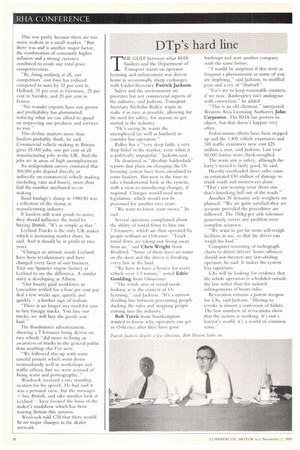DTp's hard line
Page 30

If you've noticed an error in this article please click here to report it so we can fix it.
THE GULF between what RI IA hauliers and the Department of Transport wants on operator licensing and enforcement was driven home in occasionally sharp exchanges with Under-Secretary Patrick Jackson.
Safety and the environment are priorities but not commercial aspects of the industry, said Jackson. Transport Secretary Nicholas Ridley wants to make it as easy as possible, allowing for the need for safety, for anyone to get started in the industry.
"He's saying he wants the unemployed (as well as hauliers) to consider bus operation."
Ridley has a "very deep faith, a very deep belief in the market, even when it is politically unpopular," Jackson said.
He dismissed as "absolute balderdash" reports that plans on changing the 0licensing system have been circulated to some hauliers. But now is the time to take a fundamental look at the system, with a view to introducing changes, if required. Changes would need new legislation, which would not be presented for another two years.
"We want to know your views," he said.
Several operators complained about the ability of rental firms to hire out 7.5-tonners, which are then operated by people without an 0-licence. "Truck rental firms are taking our living away from us," said Chris Wright from Bradford. "Some of them have no name on the door and the driver is breaking every law in the land.
"We have to have a licence for every vehicle over 3.5 tonnes," noted Edric Goulding from Gloucester.
"The whole in-ea of rental needs looking at in the context of 0licensing,'' said Jackson. "It's a narrow dividing line between preventing people ducking the rules and stopping people coining into the industry."
Bob Terris from Southampton wanted to know why operators can get an 0-licence after they have gone
bankrupt and start another company with the same lorries.
"I would be surprised if this were as frequent a phenomenon as some of you are implying," said Jackson, to muffled jeers and a cry of "rhubarb".
"Let's try to keep reasonable courtesy, if we may. Bankruptcy isn't analogous with conviction," he added.
"This is an old chestnut," interjected Western Area Licensing Authority John Carpenter. The RHA has powers to object, but that doesn't happen very often.
Enforcement efforts have been stepped up and the 1,400 vehicle examiners and 245 traffic examiners now cost £25 million a year, said Jackson. Last year 90,000 lorries were check-weighed.
The main aim is safety, although the lorry's record is fairly good, he said.
Heavily overloaded drive axles cause an estimated £50 million of damage to trunk roads and motorways alone. "That's not wearing your shoes out, that's knocking hell out of the roads."
Another 30 dynamic axle weighers are planned. "We are quite satisfied they are accurate provided the procedures are followed. The 150kg per axle tolerance generously covers any problem over complete accuracy.
"We want to get far more self-weigh facilities in use, so that the driver can weigh his load."
Computer screening of tachograph charts to detect drivers' hours offences should not threaten any law-abiding operator, he said. It makes the system less capricious.
LAs will be looking for evidence that the whole operation is scheduled outside the law rather than for isolated infringements of hours rules.
Revocation remains a potent weapon for LAs, said Jackson. "Having to revoke is almost a confession of failure. The low numbers of revocations show that the system is working. It's not a lawyer's world, it's a world of common sense."












































































































